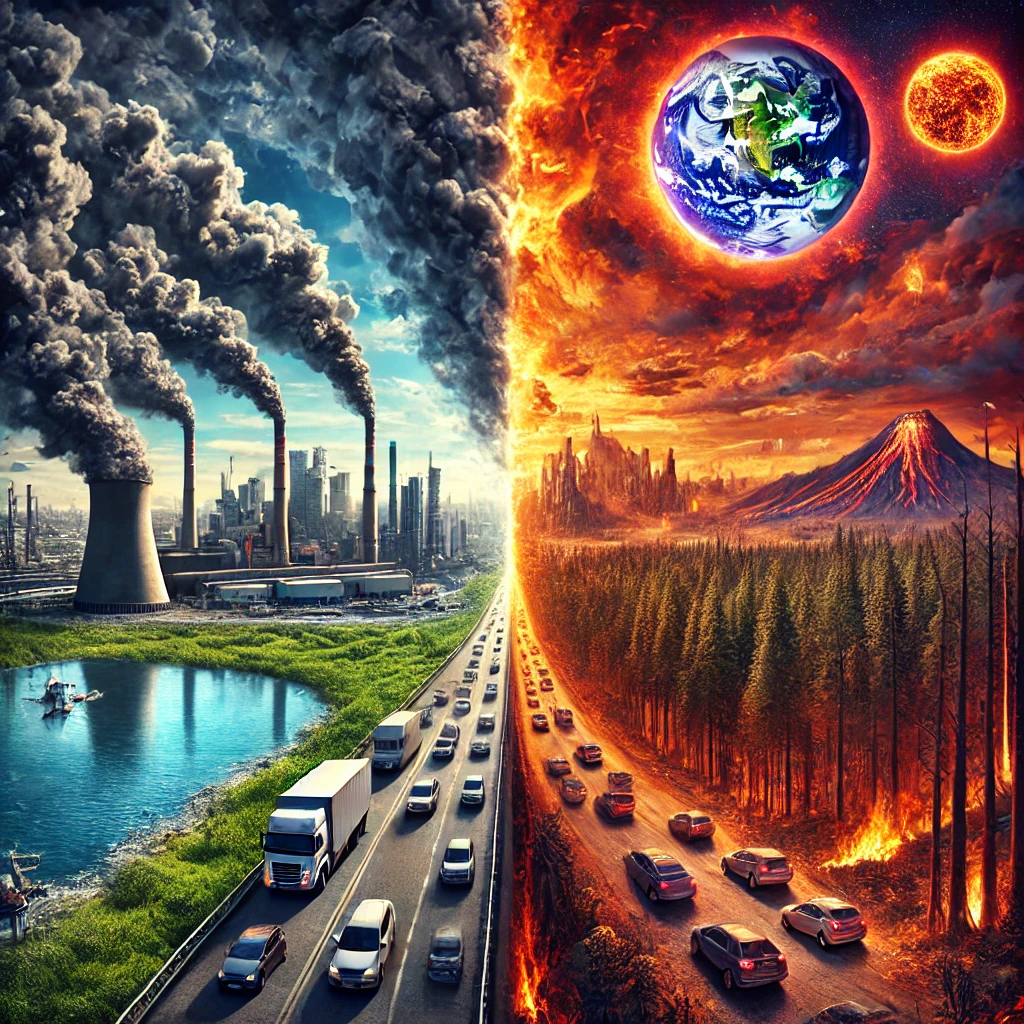Climate change is reshaping our planet at an alarming rate. While human activities and natural factors affect the climate, human contributions to climate change have dominated in recent decades. Understanding the role humans play in accelerating global warming is crucial. In this post, we’ll explore these contributions, particularly fossil fuel burning and deforestation, and look at natural climate factors.
Human Contributions to Climate Change: Fossil Fuel Burning
Fossil fuel burning is one of climate change’s most significant human contributions. When we burn coal, oil, and natural gas, we release carbon dioxide (CO2) and other greenhouse gases into the atmosphere. These gases trap heat, leading to a warming effect known as the “greenhouse effect.”
Burning fossil fuels for energy production accounts for about 75% of global greenhouse gas emissions. These emissions have been rising steadily for decades. Consequently, temperatures have increased by approximately 1.2°C since the late 19th century. The warming disrupts ecosystems, melts polar ice, and leads to extreme weather events. Without reducing fossil fuel consumption, these trends will continue to worsen.
In the past 50 years, the burning of fossil fuels has led to an unprecedented increase in CO2 levels in the atmosphere. As shown in the table below, carbon emissions rose sharply from 3.7 billion metric tons in 1970 to 36.3 billion in 2022.
| Year | CO2 Emissions (Billion Metric Tons) |
|---|---|
| 1970 | 3.7 |
| 1990 | 22.6 |
| 2000 | 25.0 |
| 2010 | 33.1 |
| 2022 | 36.3 |
This massive increase in CO2 emissions is a key driver of the current climate crisis. The link between fossil fuel use and climate change is undeniable, making it one of the largest human contributions to climate change.
Human Contributions to Climate Change: Deforestation
Deforestation is another major human contribution to climate change. Trees and forests play a vital role in absorbing CO2 from the atmosphere. Through photosynthesis, forests act as carbon sinks, helping to balance the amount of CO2 in the air. However, when we clear forests for agriculture, logging, or urbanization, we remove these natural carbon sinks.
Furthermore, deforestation releases the CO2 stored in trees back into the atmosphere. This adds more greenhouse gases to the air, increasing the greenhouse effect. It’s a double blow for the climate. Deforestation is responsible for nearly 20% of global CO2 emissions.
In the Amazon, the world’s largest rainforest, deforestation has reached alarming levels. Between 2000 and 2020, nearly 10% of the Amazon forest was lost. This loss contributes to climate change, further accelerating global warming. As we continue to cut down forests, the climate crisis intensifies.
Natural Factors of Climate Change
While human contributions to climate change are the primary cause of recent warming, natural factors also play a role. These factors include volcanic eruptions, variations in solar radiation, and natural carbon cycles.
Volcanic Eruptions and Climate
Volcanic eruptions release gases like CO2, sulfur dioxide (SO2), and ash into the atmosphere. In the short term, volcanic eruptions can cool the Earth by blocking sunlight with ash and sulfur particles. For instance, the eruption of Mount Pinatubo in 1991 led to a temporary cooling of about 0.5°C over the following year.
However, in the long term, volcanic CO2 emissions contribute to warming. The amount of CO2 released by volcanoes is small compared to the CO2 from human activities. Nevertheless, volcanic activity can influence the climate, but its impact is minimal compared to human contributions to climate change.
Solar Radiation and Climate
Solar radiation, or the energy emitted by the Sun, also affects Earth’s climate. Variations in solar output can lead to minor changes in the Earth’s temperature. During periods of high solar activity, such as during solar flares, temperatures may rise slightly. However, studies show that solar radiation’s impact on climate change is insignificant compared to human-caused warming.
In recent decades, the Sun has not significantly increased solar radiation. Therefore, the rapid warming of the Earth is primarily due to human activities. Human contributions to climate change have overshadowed any natural variations in solar radiation.
The Scale of Human Contributions to Climate Change
The impact of human activities on climate change is vast. Over the past century, the Earth’s average surface temperature has risen by 1.2°C. While this may sound like a small change, even a slight increase in temperature can have catastrophic consequences. Higher temperatures lead to melting glaciers, rising sea levels, and more frequent extreme weather events, such as heatwaves and floods.
The greenhouse gases emitted by human activities, especially CO2, methane, and nitrous oxide, have accumulated in the atmosphere. These gases trap heat, creating a blanket effect around the Earth. The resulting warming is altering ecosystems, causing species to migrate, and threatening food security and water resources.
In addition, more carbon dioxide means more ocean acidification. The oceans absorb about 30% of atmospheric CO2, but as CO2 levels rise, oceans become more acidic, threatening marine life. Coral reefs, essential for marine biodiversity, are particularly vulnerable to ocean acidification. These disruptions will continue as long as human contributions to climate change remain unchecked.
Tackling Human Contributions to Climate Change
To combat climate change, we must address the primary human contributions to climate change. This involves reducing emissions from fossil fuel burning and halting deforestation. Transitioning to renewable energy sources, such as wind, solar, and hydroelectric power, will significantly reduce carbon emissions. The move away from fossil fuels is crucial in curbing climate change.
Similarly, protecting and restoring forests is key. Planting trees and preventing deforestation can help absorb CO2 from the atmosphere. Forest conservation and sustainable land management practices will mitigate the negative effects of human contributions to climate change.
Conclusion: The Need for Immediate Action
The evidence is clear: human contributions to climate change are driving the rapid warming of the Earth. Fossil fuel burning and deforestation are the primary causes of this warming. While natural factors like volcanic eruptions and solar radiation do play a role, human activities have caused the climate crisis we face today.
To avoid further damage, we must take immediate action. Reducing emissions, shifting to renewable energy, and conserving forests are all essential steps. By addressing human contributions to climate change, we can slow down global warming and build a sustainable future for generations to come. The time to act is now.

